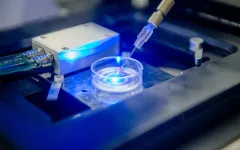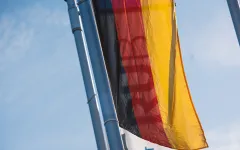In addition to the Ruhr University, four other partners are being supported: the Institute for Energy and Environmental Technology, Duisburg, the University of Duisburg-Essen, the Westphalian University of Applied Sciences / Westphalian Energy Institute, Gelsenkirchen and ZBT GmbH, Duisburg.

NRW funding
Cooperation platforms
Bochum researchers are involved in three cooperation platforms.
Producing hydrogen even at high pressure
Hydrogen is seen as a key to the energy transition. Its production by electrolysis on a large scale requires catalysts that are low in precious metals. "Due to the volumetric energy density, hydrogen production at high pressures is desirable," explains Prof. Dr. Ulf-Peter Apfel, Professor of Inorganic Chemistry and Technical Electrochemistry at Ruhr-Universität Bochum and consortium leader of the "Materials for future hydrogen technologies" project, MAT4HY.NRW for short. The aim of the cooperation platform is to specifically develop materials whose electrochemical properties allow them to be used at pressures of more than 100 bar. "We can only achieve this goal through a strong network of thematically focused partners along the knowledge and value chain," emphasizes Apfel. "These partners are all present in the Ruhr region. However, it has not yet been possible to coordinate this work together." The platform enables the partners to increase the potential for transferring knowledge to industry and to work on company-specific issues. In the medium and long term, the participants also want to support and develop extensive networking activities such as measures for participation, open science and science communication.
Don't simply give services away
Margins in the traditional product business are increasingly falling, meaning that manufacturing companies have to look for new revenue opportunities. "Although there is money to be made, many digital solutions are still given away for free with the product, meaning that there is no consistent monetization," says Prof. Dr. Jan Wieseke from the Sales Management Department at Ruhr-Universität Bochum. "This is not due to a lack of quality or performance of the industrial and digital services, but rather a lack of expertise in solution selling, the integrated sale of physical products, industrial and digital services." In order to be successful in industrial solution selling, it is essential to develop new skills at the interface between the Sales and Service units. The "Solution Selling Cooperation Platform through the Integration of Sales and Service Components", or SolutiKo for short, addresses this by providing manufacturing companies with broad access to dialog and networking with cutting-edge research in solution selling.
The Sales Management Department (SMD) at Ruhr University Bochum and the Service Management Department at FIR e.V. at RWTH Aachen University are involved, as well as numerous external participants from manufacturing companies in NRW.
Using water sustainably
Climate change, demographic developments, changes in land use, technological innovations and changes in consumer behavior are bringing about comprehensive changes in water management that cannot be managed by sector-specific or local measures alone. "This applies in particular to resource-oriented water management, which must adapt to more frequent and more intensive extreme events such as heavy rainfall, drought and drinking water emergencies," says Prof. Dr. Martina Flörke, Chair of Engineering Hydrology and Water Management at Ruhr-Universität Bochum. "At the same time, the pressure for resource efficiency and adaptation to climate change is increasing in the context of the energy transition." These increasingly complex challenges require interdisciplinary and transdisciplinary solutions for sustainable water management, in which cooperation between local institutions and stakeholders as well as cooperation at regional level will be of central importance. The cooperation platform "Zukunftsnetzwerk wasser^plus für den Transfer in der Region", or wasser^plus OWL for short, promotes and anchors long-term communication, transfer and dialog between stakeholders from science, practice and society in the field of water management.
The Ostwestfalen-Lippe University of Applied Sciences (lead partner) and the Ruhr University Bochum are working together on the project.


